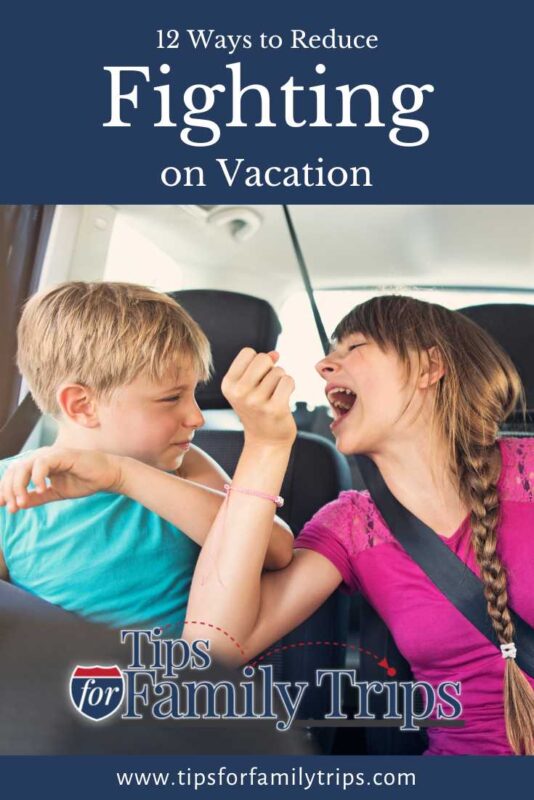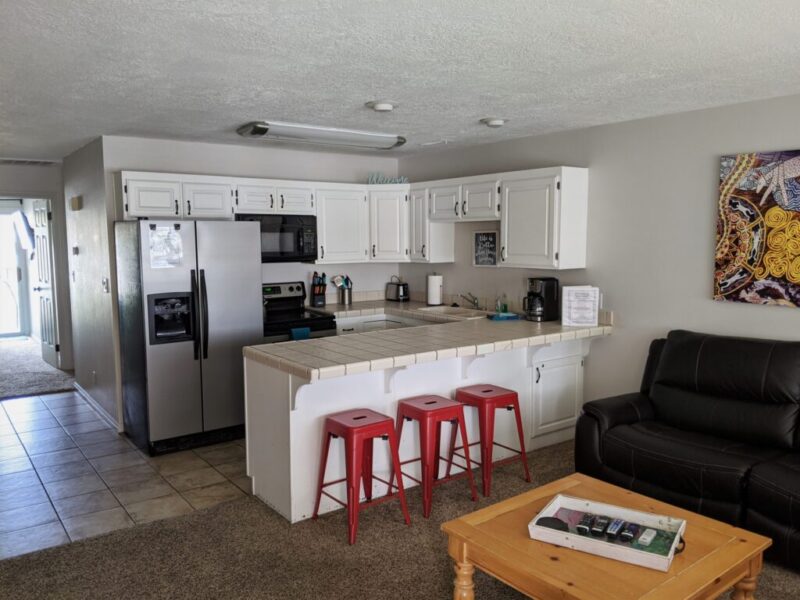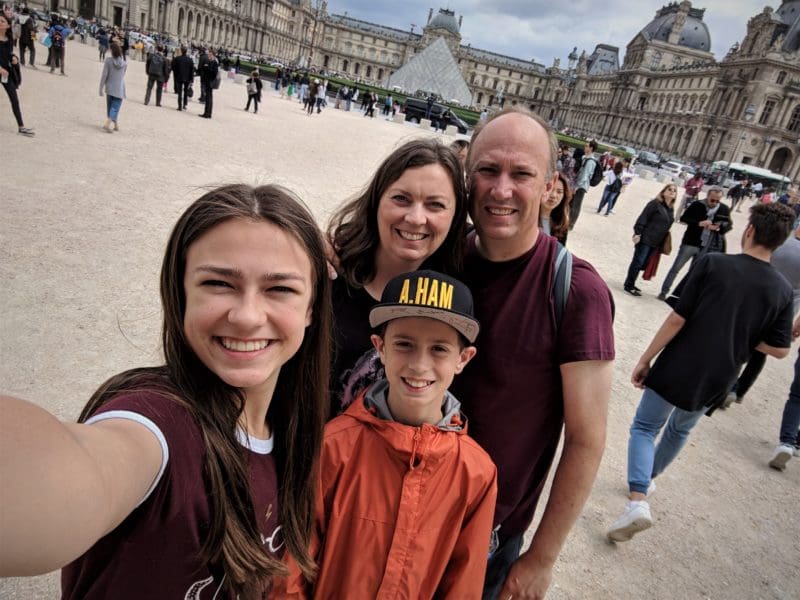Fighting, drama, conflict… Whatever you call it, vacation fighting is one of the most challenging parts of any family trip.
It's natural that when members of a family spend many hours together, conflicts will happen. After all, most of us don't bother to use our best behavior around our families. And vacations often push the limits of our comfort zones, which can result in memorable highs and lows.
The highs are what most of us remember and cherish after the trip. They are what makes traveling with our family so worthwhile.
But the lows can be low enough to make you wonder if planning a family vacation is really worth it.
I've been traveling with my husband and two teen children for nearly 20 years. We've lived through plenty of vacation fights. We keep traveling because it makes our family stronger, smarter, and happier.
We have developed a few strategies for reducing family vacation fighting. We have also learned that the typical conflicts that arise on family vacations can help kids learn important life skills.
Here are my top tips for reducing (and making the most of) family vacation conflict.

Expect problems
No family vacation is perfect. You know your family and you probably have a good idea of who is most likely to react badly to specific triggers.
Anticipate common conflicts and make plans to avoid them. Here's an example of how my family has done this.
My husband hates rush hour traffic and hunting for a parking space in an overcrowded lot. These challenges can make him grouchy, which is contagious and may lead to fights that have nothing to do with the traffic.
Heavy traffic doesn't bother me as much. So, I drive when we expect traffic or parking hassles and that helps us avoid fights before they happen. It took us years to figure out this simple solution!
Get everyone involved
One of the best ways to get everyone excited about the vacation is to involve everyone in the planning. Really listen to what everyone wants and build it into the itinerary.
This is the kind of teamwork that strengthens families and helps kids prepare for adulthood.
My family is currently planning a trip to Japan. It's my teen daughter's dream trip, so we are letting her plan our itinerary.
She has done a lot of research and is doing a good job of including things that the rest of us want to do. My husband and I will help figure out transportation, hotels, and other details.
I love seeing her excitement and maturity so much that I don't really care if her itinerary is different from what I would have planned.
Respect differences
Members of the same family often have different interests and personalities. And that's OK.
My husband and I love hiking and sightseeing at the national parks, but our kids are less enthusiastic. I'm not sure where we went wrong…
Sometimes we insist that they hike and sightsee with us, but sometimes we let them stay in the car with their electronics and wait for us. When we all hike together, we often give them the car keys on the way back so they can hurry ahead and relax their way, while I take my time.
Differences will be much more dramatic in some families – especially when spouses have different travel priorities. Reduce conflict by respecting those differences, showing love, and finding compromises that work for you.
Research everything
Most negative reviews of hotels and vacation activities are written by people who thought they were getting one thing and actually got something else. Unmet expectations and unpleasant surprises can easily cause fights on a family vacation.
Don't ever make assumptions. The best way to avoid unmet expectations and unpleasant surprises is to thoroughly research your destination, hotel, and activities before you leave home.
Check the official website and read lots of reviews so that you understand what you're really signing up for. Then share this information with your family so that they won't be surprised.
Here is an example where appropriate expectations made all the difference to my family.
We were spending the 4th of July in Washington D.C. Exciting, right?
We wanted a hotel within a couple of blocks of the National Mall so we could enjoy the fireworks and avoid the crowds on the Metro afterward. But hotels near the National Mall are expensive on the 4th of July. After much research, we found an older hotel in the perfect location that we could afford.
We read reviews and learned that it wasn't great, but a lot of people loved it for the location and price. Knowing the downsides, we decided to book for two nights.
And it really wasn't great. It was old and it was noisy. But the location was fantastic and we got two small adjoining rooms with two bathrooms for one “family” price. My kids hated it, but my husband and I were completely satisfied because we knew exactly what it was before we booked it.

Don't blame
This one is a problem for my family. When something goes wrong, our natural response is to blame someone else in the family.
However, blame never solves the problem or gets our vacation back on track.
It's better to focus on what you can do NOW to solve the problem. If someone is at fault, take a deep breath and treat them with love and patience. Everyone makes mistakes.
I loved this article from Psychology Today that offers 5 phrases you can use to get your vacation back on track after the blaming starts. They give the other person a free “do-over.” They are:
- Can you rephrase that, please?
- Let's rewind here
- Is this really what you want to be saying/doing now?
- What would you do if you were me right now?
- What do you think I'm going to say here?
Emotions like anger and sadness are normal, even on a family vacation. When you are the one who is upset, it's an opportunity to show your kids how to cope with negative emotions in the right way.

Plan downtime
Family vacations can be exhausting. It takes a lot of energy to successfully get there. Then, if you're like me, you want to see and do everything once you arrive.
Exhaustion frequently leads to fighting.
Don't overschedule your vacation. Let everyone do what they want for a few hours every day. Consider scheduling a full or half-day to just hang out at your hotel. You're paying for the pool and other amenities, so why not get the most from them?
If you have young children who need naps, plan your schedule around them. Tired toddlers are no fun. Pack a nap-friendly stroller, or plan your drives around nap time, or head back to the hotel for a nap break.
My family likes to get up early, stay busy all day, eat an early dinner, and then just lounge around the hotel until bedtime. When my kids were younger, spending evenings in the hotel pool was their favorite part of the vacation. Now that they are teens, a couple of hours in their “electronic bubble” usually does the trick.
Divide and conquer
You don't have to do everything together on a family vacation. You don't even need to take the whole family on every vacation.
My teens didn't want to follow me and my husband around The Louvre in Paris, so we agreed on a meeting time and place and let the two of them explore the museum without us. They stuck together and we crossed paths several times.
On a Washington D.C. trip, my daughter wanted to visit the Holocaust Museum, but my son was too young. She and my husband visited the museum while my son and I relaxed in the Young Reader's Center at the Library of Congress.
My teens love cruises because it's a family vacation that offers a lot of independence. We eat dinner and do excursions together, but it's easy for everyone to do their own thing on the ship most of the time.

Rearrange seating
The traditional arrangement for family road trips is Mom and Dad in the front seats with kids in the back. Consider a different arrangement to reduce conflicts.
I always sat in the back seat during long drives when my kids were newborns. That made it easy for me to keep the baby happy and put more miles behind us without stopping.
When I had two young children and a minivan, I put the toddler on the back row and the baby on the middle row, both on the driver's side. I sat on the middle row, passenger side where I could see and talk to my husband and easily reach both of the kids.
Do you have teenagers? Would they like a turn in the front seat? You could use it as a reward for good behavior and for helping with younger siblings in the back seat. It might encourage good conversation between the teen and the parent who is driving.
Putting a non-driving adult in the back seat for a while may also help reduce conflict between younger children.
Buy or rent a bigger vehicle
A lot of backseat fights start because kids are sitting too close to each other. If you take road trips often, consider buying a family vehicle that gives everyone extra space. If you don't want to buy a big vehicle for everyday use, consider renting one for long road trips.
I have a family of four, but we drive a minivan with eight seatbelts. When I was growing up, my family of six had a 12-passenger van. My next-door neighbor has a 15-passenger van for their six kids.
Kids in the backseat will start fewer fights when they have plenty of personal space.
Related: Tips for Saving Money on Your Rental Car

Book larger lodging
Personal space at your hotel or rental can reduce conflict just as much as personal space in the family car. Consider booking a vacation rental with enough bedrooms and bathrooms for your family, or an extra hotel room.
My family of four often shares a single hotel room. It works well enough, but sharing one room and one bathroom for more than a couple of nights can create stress and conflict.
We book vacation rentals with at least one bedroom or family-sized hotel rooms as often as we can. It makes a big difference.
Related: Tips for Booking a Great Vacation Rental
Pack some surprises
Long travel days are challenging. I love road trips or hanging out at airports… for the first couple of hours.
Help keep spirits up by planning a few surprises. These could include:
- Treats that you don't usually buy at home.
- New travel toys and games
- Rent or buy a new movie
- Buy a new book or magazine
Introduce a happy surprise before a tantrum starts or after you've all recovered. Don't reward bad behavior.
Related: 10 Fun Travel Toys that Fit in One Backpack
Take care of yourself
Is it really everyone else that is causing all the fights, or are you part of the problem? Be honest.
One of the perks of being the parent is that YOU get to plan the trip that YOU want. Yes, you should plan activities that the whole family will enjoy, but I've found that my kids don't really care where we go as long as “hotel pool time” is on the agenda every evening.
Plan a trip that plays to your strengths and gets you excited. Your children will probably follow your lead and be excited too.
Planning and executing a successful family vacation is a lot of work. When you take care of yourself, it's easier for you to take care of the rest of the family.

Conclusion
Family vacation fights are no fun. They are impossible to eliminate, but these strategies can reduce their frequency. Especially if you and your spouse work together.
Even with the conflicts, family vacations are worth it! They create family time and lifelong memories that you can't get in any other way.
I hope that our experience helps your family plan a great vacation. Do you have tips to share? Please add them to the comments.
Happy travels!












Have a question or comment? Add it here.